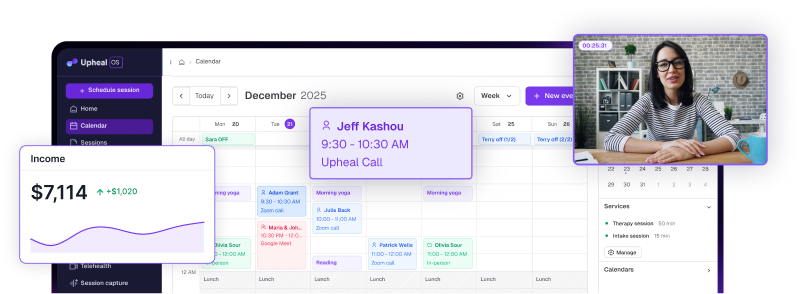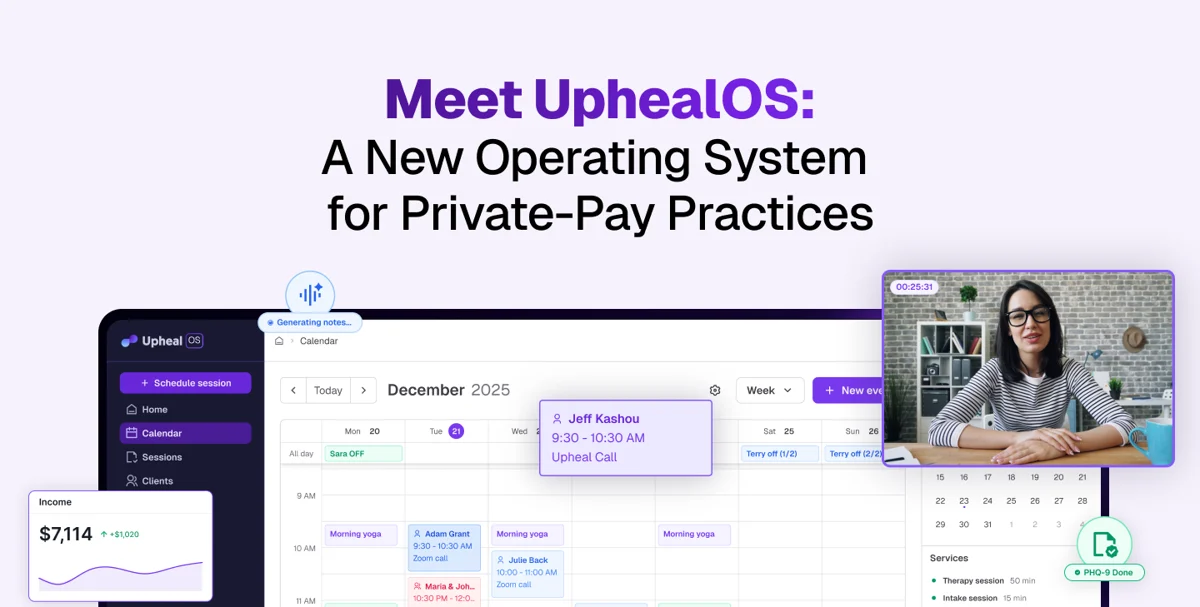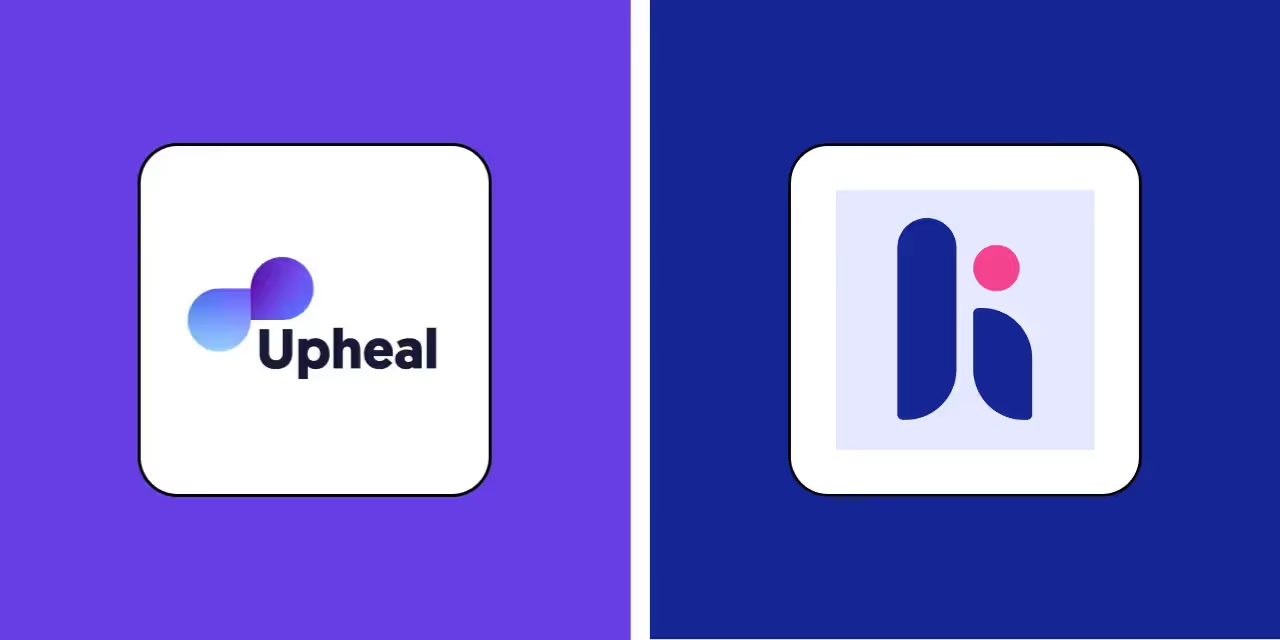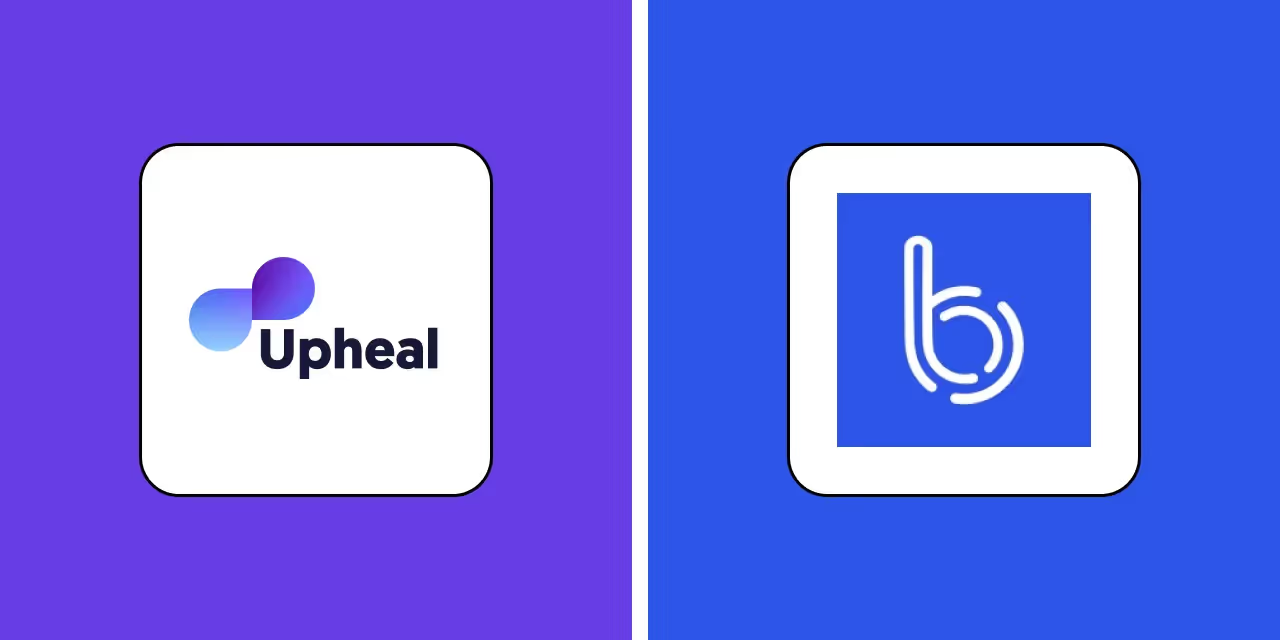Upheal vs Clinical Notes AI: Privacy, value, and features compared
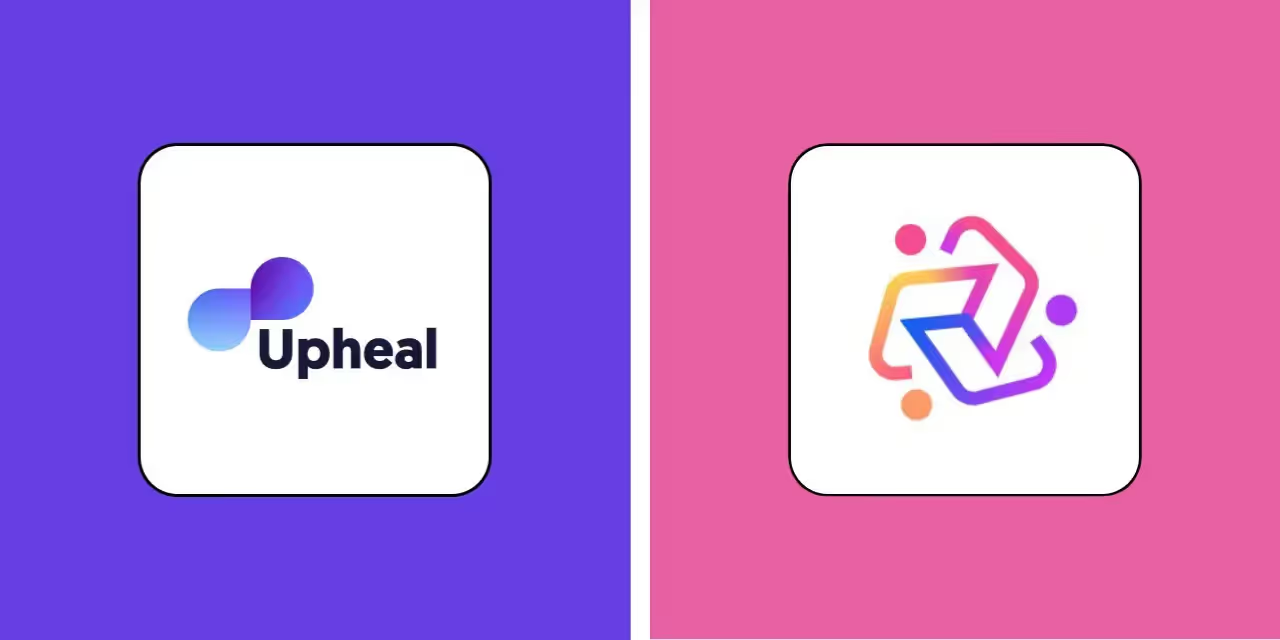
The landscape of AI-powered clinical documentation presents therapists with an increasingly complex choice: platforms that prioritize convenience versus those that safeguard the sacred trust between clinician and client.
Clinical Notes AI positions itself as a comprehensive dictation solution for all healthcare professionals, offering unlimited documentation at competitive rates.
Upheal takes a different approach entirely — building privacy-first AI specifically for mental health practitioners while delivering sophisticated clinical insights that extend far beyond basic transcription.
This comparison examines the critical differences that matter most to behavioral health professionals: how these platforms handle client confidentiality, their approach to clinical value versus raw efficiency, and whether they truly understand the unique complexities of therapeutic documentation.
Privacy and ethics
The most significant distinction between these platforms lies in their foundational approach to client data — an area where mental health professionals demand absolute clarity and control.
The information in the table above is current as of August 2025. It will be updated quarterly to reflect any recent improvements to Clinical Notes AI's privacy policy as they catch up to Upheal.
Opt-in versus opt-out
Upheal requires explicit opt-in consent from both therapist and client before any session data is used for AI model training. This consent-first approach ensures complete transparency about how therapeutic conversations are handled, respecting the fundamental principle that clients should actively choose to participate in AI development rather than being enrolled by default.
Clinical Notes AI operates under a more traditional healthcare AI model, where data usage policies remain largely undisclosed. Their terms of service lack specific information about whether and how session data is used for AI training, leaving therapists without clear answers to provide clients who ask about data protection.
Is Clinical Notes AI safe?
Clinical Notes AI's terms of service include concerning provisions that allow the company to sell "aggregated session data" and share information "for research purposes." In today's rapidly evolving AI market, these broad permissions create significant risks for mental health professionals and their clients.
The current landscape includes numerous AI platforms developing "therapist" chatbots and mental health applications. These companies actively seek large datasets of therapeutic conversations to train their models, creating a lucrative market for aggregated session data. When AI documentation platforms maintain loose privacy policies, they potentially enable the mass sale of therapeutic conversations to data brokers who then use this information to create AI systems that could replace human therapists.
This isn't theoretical concern — it represents a fundamental threat to the therapeutic profession. Client conversations that begin in the safety of a confidential therapeutic relationship could ultimately train AI systems designed to replicate or replace that very relationship. For therapists committed to protecting both their clients' privacy and their profession's future, platforms with ambiguous data policies pose serious ethical risks.
Feature comparison: Clinical depth versus basic documentation
While both platforms handle dictation-to-note generation, their feature sets reveal fundamentally different philosophies about what therapists need from AI documentation technology.
The information in the table above is current as of July 2025.
What $20 gets you on each platform
At the $20 price point, the platforms offer markedly different value propositions. Clinical Notes AI's $15/month Dictation plan provides unlimited dictations, 20 live session credits monthly, and 2 document credits — essentially covering basic transcription needs for smaller practices.
Upheal's $19/month Starter plan delivers unlimited notes, all note types, Smart Edit functionality, note template customization, and the ability to capture sessions across multiple formats including in-person, virtual, and manual uploads. This represents significantly broader functionality for practitioners who need flexibility in how they document therapeutic work.
The Golden Thread on Upheal and Clinical Notes AI
Clinical documentation in mental health has long suffered from fragmentation. Treatment plans exist in isolation from progress notes. Assessment findings rarely connect to ongoing interventions. Insurance companies demand clear therapeutic narratives, yet most documentation systems create siloed information that obscures rather than illuminates the therapeutic journey.
The Golden Thread concept addresses this fundamental challenge by creating seamless integration between all components of clinical care. Rather than treating treatment plans as static documents created once and rarely revisited, Golden Thread transforms them into living frameworks that guide and connect every therapeutic interaction.
Upheal's Golden Thread feature operationalizes this concept through sophisticated AI analysis of session content. The system identifies treatment priorities from your clinical conversations, suggests evidence-based interventions aligned with established therapeutic frameworks, and automatically weaves treatment goals into your ongoing progress notes.
The result is documentation that tells a coherent story of therapeutic change. Insurance reviewers can immediately understand medical necessity. Supervisors can track clinical reasoning and intervention effectiveness. Most importantly, therapists can see patterns in their work that inform more intentional, outcome-focused care.
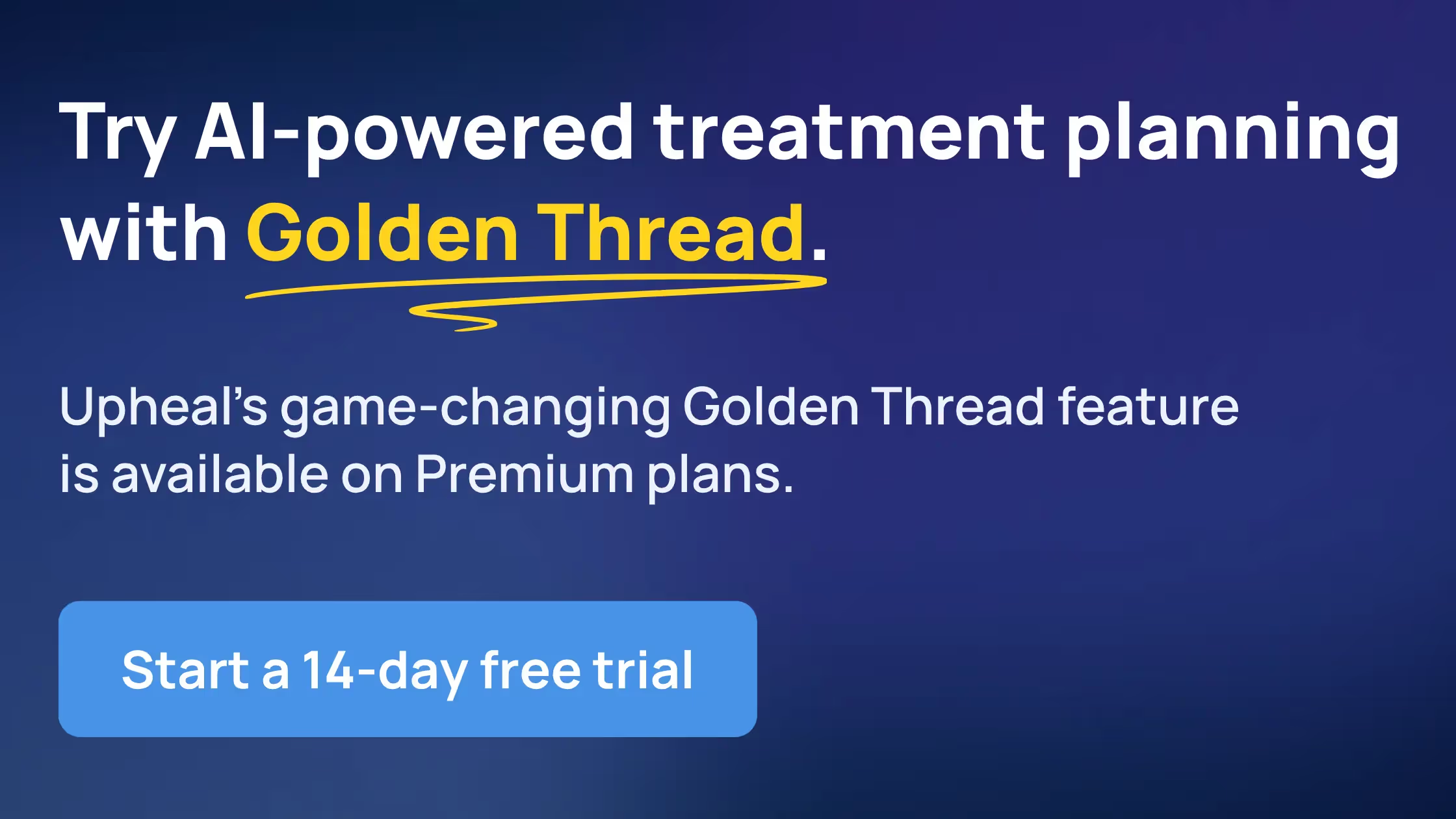
What therapists think about these platforms
The therapeutic community's response to these platforms reveals telling insights about what practitioners truly value when balancing efficiency with clinical sophistication.
Cost-effectiveness remains a primary concern for solo practitioners and small group practices:
"I got Clinical Notes AI and now I read my notes into that for it to write the notes for me. It's $60 a month with no limit and it will write any kind of note that you can think of for mental or behavioral health."
And, the value you get for your subscription is often highlighted in discussion amongst clinicians:
"[Upheal is] more reasonably priced than competitors and that's important to me since I'm in private practice as a single employee who pays all my bills."
John Maxwell, LMFT
When AI can identify therapeutic patterns, track client progress over time, and provide insights into session dynamics, documentation becomes a tool for professional development rather than merely regulatory compliance.
Choosing your clinical documentation partner
The choice between Upheal and Clinical Notes AI ultimately reflects your priorities around privacy, clinical sophistication, and professional values.
Clinical Notes AI serves therapists who prioritize straightforward dictation functionality at competitive rates. The platform excels for practitioners who primarily need efficient transcription services and are comfortable with standard healthcare industry approaches to data handling. For therapists seeking basic documentation support without complex clinical features, Clinical Notes AI provides reliable functionality.
Upheal represents a fundamentally different approach — one that views AI as a clinical partner rather than just a transcription tool. The platform's privacy-first design, sophisticated analytics, and therapeutic specialization appeal to practitioners who want technology that enhances their clinical thinking while maintaining the highest ethical standards.
For therapists concerned about data privacy, professional growth, or the long-term implications of AI in mental health practice, Upheal's transparent consent model and clinical sophistication create a foundation for ethical AI adoption that serves both immediate efficiency needs and broader professional values.
The question isn't just about today's documentation needs — it's about partnering with a platform that aligns with your vision of how technology should support therapeutic relationships. When your documentation tool understands therapy as deeply as you do, the result isn't just faster notes — it's enhanced clinical care that honors the trust clients place in the therapeutic process.
